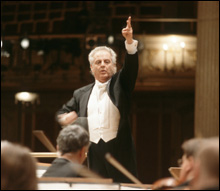 Symphony Hall was packed for James Levine’s “all-Beethoven” concert, the latest installment in his ambitious Boston Symphony Orchestra Beethoven/Schoenberg series. (Even with the gorgeous pre-12-tone Pelleas und Melisande, will it be packed again for this weekend’s all-Schoenberg concert?) And the following night, courtesy of the Bank of America Celebrity Series, pianist/conductor Daniel Barenboim took over Symphony Hall with his Staatskapelle Berlin (an orchestra founded in 1570, though no one looked it) to conduct Mozart: the first two of his three last symphonies and, also playing, a piano concerto.
Symphony Hall was packed for James Levine’s “all-Beethoven” concert, the latest installment in his ambitious Boston Symphony Orchestra Beethoven/Schoenberg series. (Even with the gorgeous pre-12-tone Pelleas und Melisande, will it be packed again for this weekend’s all-Schoenberg concert?) And the following night, courtesy of the Bank of America Celebrity Series, pianist/conductor Daniel Barenboim took over Symphony Hall with his Staatskapelle Berlin (an orchestra founded in 1570, though no one looked it) to conduct Mozart: the first two of his three last symphonies and, also playing, a piano concerto.
Levine’s Beethoven was another of his long programs: the enchanting Second Symphony (early Beethoven), the oddball Triple Concerto (middle Beethoven), and the masterful Seventh Symphony (late middle? early late?). The emphasis was on virtuosity. The antiphonal first and second violins, with a wonderful transparency of texture, made audible the written contrasts you can rarely hear when all the violins are on the same side.
In his program note, Levine explained that he was choosing works that demonstrated contrasts in Beethoven’s development, changes in musical language — here two symphonies with slow introductions and fundamental classical structure, but the early one filled with ideas “almost to bursting” and the later one “restricting his materials to the bare essentials.” We’ll get to hear a similar evolution in Schoenberg.
This Beethoven program chose exhilaration and speed over poetry. The Second Symphony begins Adagio molto, “very slow,” but Levine’s tempo was awfully brisk for an Adagio. The rest of the first movement teased us with expectations of tragedy and heroic resolution and gave us something in between. The enchanting Larghetto, though, unfolded a slow dance of ideas and delicate, gracious, almost Schubertian interludes. The Scherzo was teasing and playful. And the finale, Allegro molto, is in some ways this symphony’s high point of invention. Levine handled well the sudden slowdowns and ensuing eruptions.
Beethoven’s Triple Concerto, in which the “soloist” is a piano trio, is a big, enjoyable piece with a bad reputation. It seems to go on too long, and the attractive themes — so idiomatic, as Levine pointed out in his note, for their respective instruments (thrusting violin; warm, searching cello; broadly phrased piano) — don’t quite support Beethoven’s extended developments. But it’s a fascinating, anomalous piece. The last BSO subscription performance was nine years ago, so I was glad to hear it again. It begins with a masterstroke, a mysterious rumble that then opens out into something vigorous, public, almost ceremonial. The slow movement is a kind of passageway into the Polish rondo, a lively dance with the best tune in the piece.
Each movement begins with the cello, which has the most difficult music. Ralph Kirshbaum played with warmth but also with a strangely hollow, almost disembodied tone and (to my ear) occasionally questionable intonation. Violinist Miriam Fried provided the oomph, rhythmic dynamism embodied in a tightly focused tone, all line where the cello was all texture. The pianist was Fried’s son, Jonathan Biss, who gets better each time I hear him. After a slightly unsettled start, he played with imposing authority, and on a grand scale.